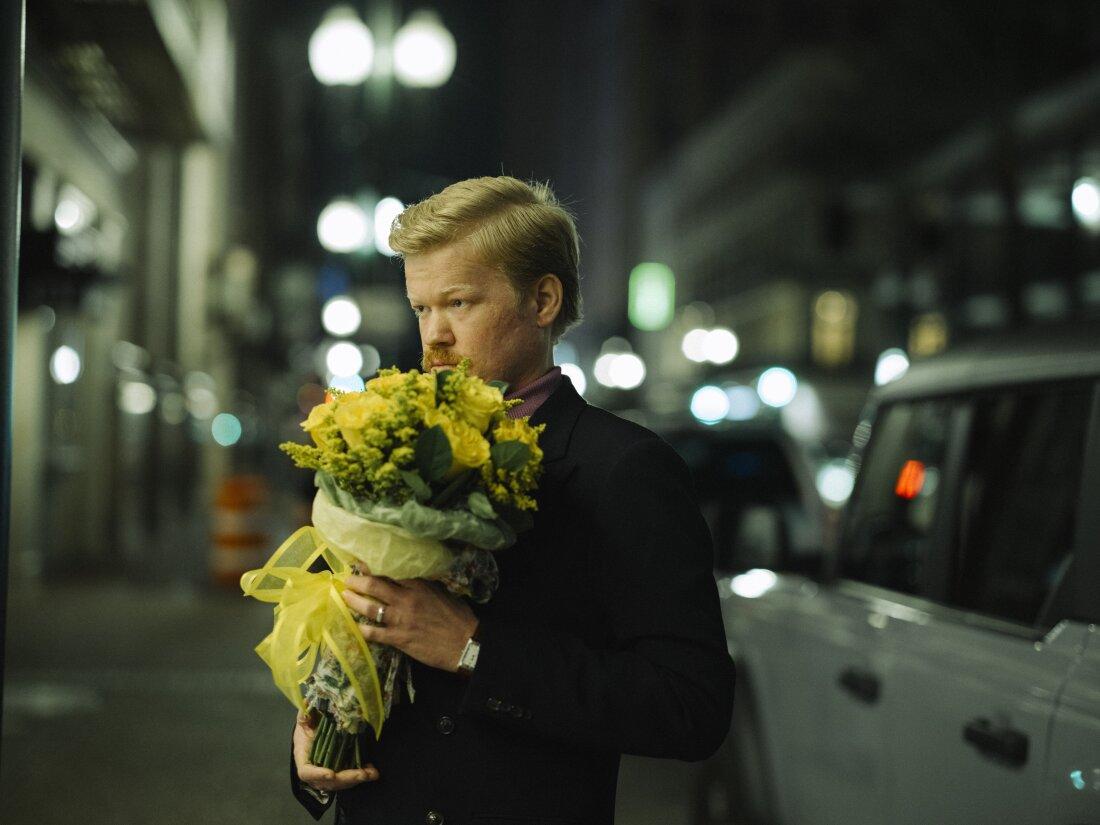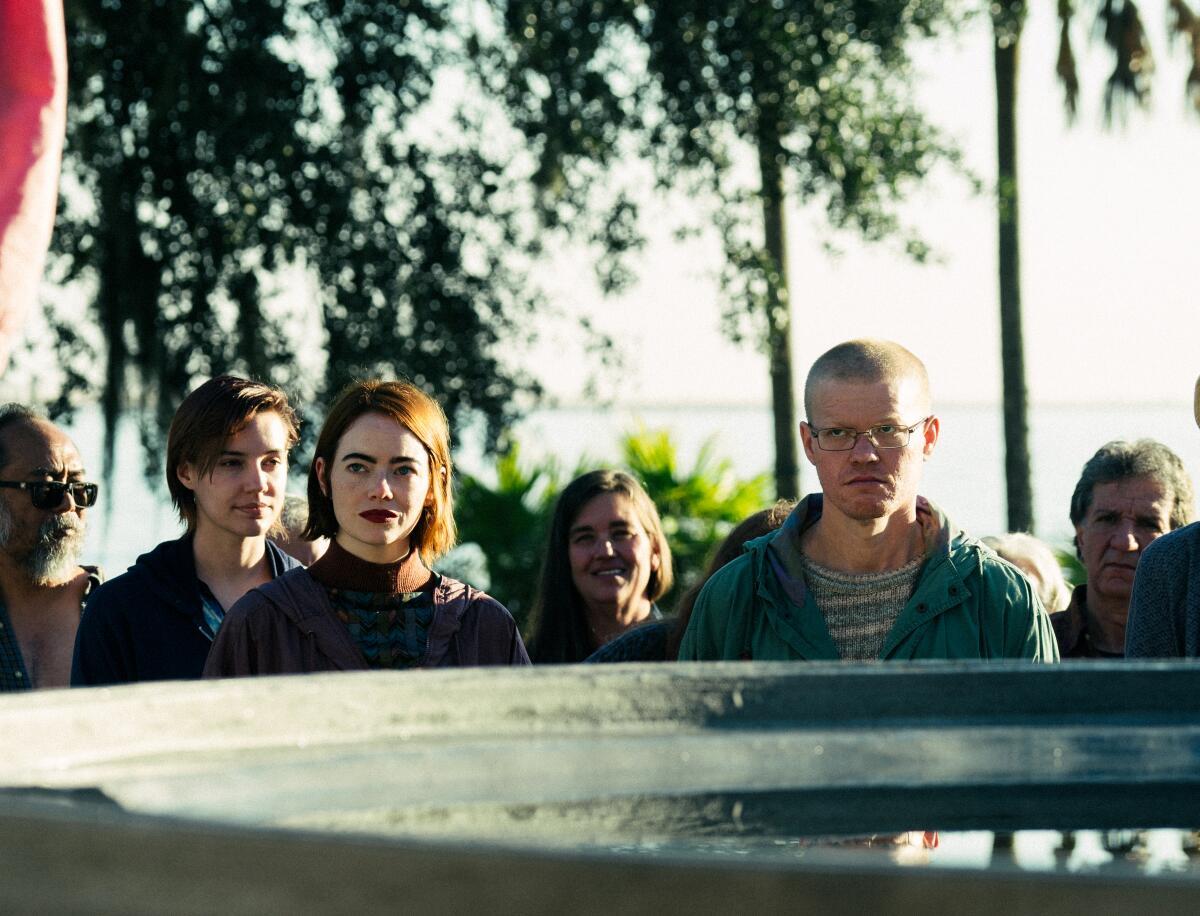Kinds of Kindness may be an anthology of three short(ish) black comedy films by Yorgos Lanthimos, but it is no less artistically innovative and curiously daring as his films are known to be.
There are certain things you should be aware of before you start watching a Yorgos Lanthimos film. Chiefly the fact that he is unconcerned with normal. In those fleeting moments when his films appear to depict something normal, it is only a clever ruse. Yorgos as a filmmaker steers intentionally into the field. He blends fantasy, horror, and reality to create a singular genre that most other filmmakers wouldn’t have the gall or vision to adequately convey. His films can be bizarre, grotesque, and powerfully fearless. In other words; prepare yourself – things are about to get weird.
Kinds of Kindness
Directed By: Yorgos Lanthimos
Written By: Yorgos Lanthimos, Efthimis Filippou
Starring: Jesse Plemons, Emma Stone, Willem Defoe, Margaret Qualley, Hong ChaoRelease Date: June 28, 2024
Kinds of Kindness is no variation from what we have seen from the increasingly popular (and lauded) filmmaker. You must prepare yourself for a film that is challenging, but not difficult to comprehend. Its complexity comes from the way it nonchalantly incorporates non-conformity. In the realm of Lanthimos’ films, this attribute is nothing new. In fact, I would call it his greatest strength as a filmmaker. He sells the audience on something they didn’t even know was possible, because it isn’t.
This film is really three films in one. It is an anthology of unimaginable realities, but strung together by the basic human need of wanting to be accepted. Each story features the same main group of actors, but portraying different characters in each. Jesse Plemons and Emma Stone portray the two main characters in every section, providing a sense of continuity along with a familiar approach to the film’s visual palette. Each section feels like a twisted but modern fairy tale.

Each story revolves around a main character who can’t really exist on their own. They don’t really fit anywhere, and as such are desperately searching for that elusive inclusivity. In the first film, Plemmons portrays a character who is part of what appears to be an overbearing crime syndicate, which requires the complete sacrifice of one’s freewill. In the second film, Plemmons is a police officer whose wife has gone missing, and he can’t function without her. In the final frame, Stone portrays a woman who is part of a strict cult, and she struggles between the life she had before and finding her true potential.
Kinds of Kindness isn’t as visually stirring as Lanthimos’ most recent films. Each short film exists in our modern world, but there is something sinister lurking just off screen. It isn’t as overt with its premise as The Lobster, and instead mixes reality with mysticism like The Killing of the Sacred Deer. From many perspectives, Kinds of Kindness belongs right in the middle of Lanthimos’ never-know-what-you-are-going-to-see filmography. It is as good at surprising its audience as it is disguising its crazier aspects within the monotony of everyday life.
The film’s presentation blends the flamboyance of Yorgos’ more recent output with his more restrained depictions of something gone awry in everyday life. Lanthimos’ artistic eye doesn’t just pertain to creating impressive and striking shots, it is in the way he manages to incorporate the off-kilter and black comedy tone of the film in its visual language. There are moments of visual juxtaposition that make you laugh out loud without any characters uttering a word. There are other moments when the film intentionally makes the audience uncomfortable, and you can’t help but appreciate the joke at your expense.

That’s the kind of trickery Lanthimos is known to play. He challenges his audience, and isn’t afraid to convey outright sexual, violent, or otherwise disturbing imagery not for its shock factory alone – but as a matter of humor. Sure, maybe you could argue that it is somewhat immature and uncouth, but that is exactly the type of expression the Lanthimos is trying to make. Nothing is out of the question, and as an audience that feeling of no boundaries – even a filmmaker taking shots at you – makes the experience unique.
The way the film utilizes the same cast for the three separate films/stories, is also unique. This creative decision (along with using titles that link the three stories together in a way that breaks the fourth wall) makes the films each feel like chapters in a larger narrative arc, even if no such continuity exists. The themes are common though, as the film reflects on personal identity, what it means to love someone, and our responsibilities to those things we place value upon. Indeed, the plural nature of the film’s title alludes to the film’s varying depictions of devotion.
And yet, I can’t help but feel like the film is also twisting the idea of devotion to demonstrate how close it is to manipulation. All of the main characters in the film have some sort of ideology they adhere to which motivates their life decisions. The film could easily classify these motivations as love or faith – something seen in the greater populace as good or pure. But Lanthimos turns those premonitions against us. While those characters are placing effort in places that traditionally can be seen as valuable, the truth is often much more sinister.

In the first story, Jesse Plemons plays a character who lives comfortably because someone else takes care of him. He feels devotion towards this person because of everything they have done for him, and this is demonstrated by his self-destructive behavior when it gets taken away from him. But in the grand scheme of things, he is being used. He is only being given this life because what he does is of value to this person that takes care of him. It is a quid-pro-quo relationship, not unconditional.
In the second story, Plemons is a police officer whose wife has gone missing. His life revolves around her to the point where his psychological health is breaking down without her. With traditional values, this type of devotion to one’s life partner is applauded. But in this story, the character’s love for someone else becomes harmfully self-centered. His love becomes weaponized in the worst way, and as a result Lanthimos makes you question whether or not the character’s ‘til death-do-us-part’ commitment was worth it in the end.
Plemons and Stone are the stars of this film, with Willem Defoe and Hong Chao also putting in some incredibly memorable performances. While the plot does drag on in some moments, the film never ceases to emotionally connect with its audience in some way. That feeling can be one of pleasure or pain, and often both at the same time. Yorgos Lanthimos is an expert at throwing every emotion possible at his audience, and getting most of it to stick. Kinds of Kindness isn’t always pleasurable, but you always want more.

